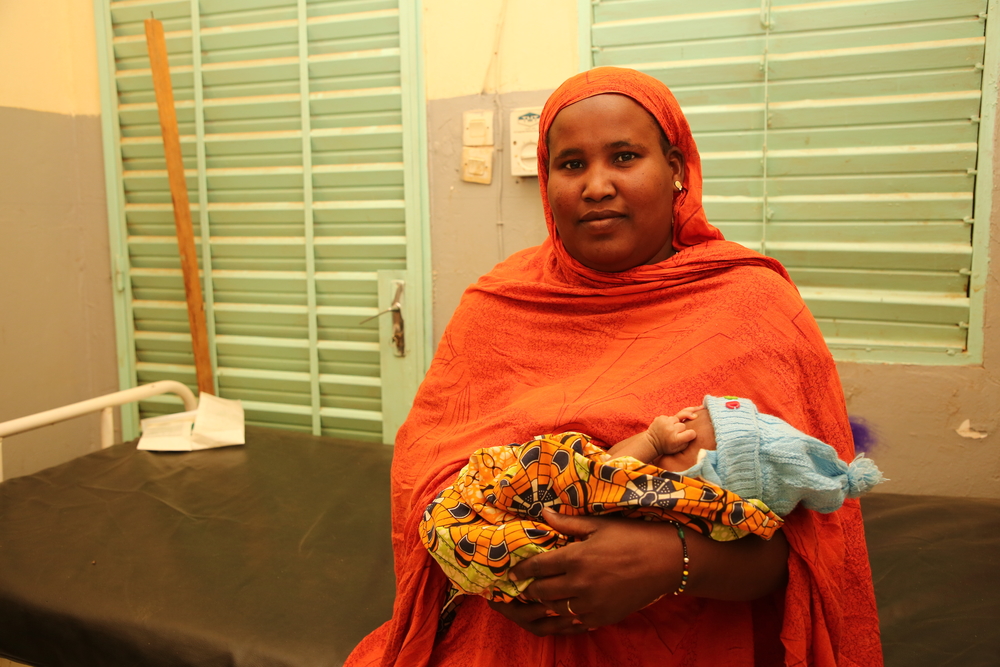
사진: 말리 출신 '완리'가 조카를 안고 있다. 산모인 아미나투는 집에서 출산한 후 합병증을 앓게 되어 안송고 위탁 보건소 산부인과 병동에 입원했다. ©Seydou Camara
임신/출산 지원 (생식 보건)
응급 산과 지원 및 신생아 지원은 국경없는의사회 활동에서 중요한 부분을 차지합니다. 의료진은 분만을 보조하고, 필요하고 가능한 경우 제왕절개를 실시합니다. 분만과 출산 이후에 산모들과 신생아들은 적절한 지원을 받습니다.
비교적 장기적인 국경없는의사회 프로그램 중에는 보다 광범위한 산모 보건을 제공하는 경우가 많습니다. 산전·산후 진료를 위해 병원을 찾을 것을 산모들에게 권하고, 필요한 경우 HIV/AIDS의 모자간 수직감염 예방 활동을 실시합니다. 모든 프로젝트에서 가능한 일은 아니지만, 경우에 따라 피임 서비스와 안전한 낙태 지원도 이루어집니다. 임신 중절과 관련된 의료 지원의 필요성은 분명 존재합니다. 2016년, 국경없는의사회는 낙태와 연관된 문제와 합병증을 가진 여성, 소녀 총 1만6000여 명을 치료했는데, 이들 중 많은 수는 위험한 방식으로 임신 중절을 시도하다가 병을 얻은 경우였습니다.
숙련된 의료진이 분만을 돕고 출산 직후에도 필요한 지원을 한다면 산과 누공을 예방할 수 있습니다. 산과 누공은 사회적으로 수치스러운 병이라고 여겨져 만성적인 실금을 유발할 수도 있습니다. 국경없는의사회는 매우 외진 몇몇 지역에서 누공 치료를 위한 수술도 제공합니다. 2012년부터 국경없는의사회는 자궁경부암 검사 및 치료를 시범적으로 실시했습니다. 자궁경부암의 주원인은 사람유두종바이러스(Human Papilloma Virus, HPV)인데, 이 바이러스는 특히 HIV 양성인 여성들에게 피해를 끼칩니다.
2016년, 국경없는의사회는 24,000회의 제왕절개를 포함해 총 25만 회의 출산을 지원했습니다.
Reproductive healthcare
Emergency obstetrics and newborn care are an important part of MSF’s work. Medical staff assist births, performing caesarean sections when necessary and feasible, and mothers and newborns receive appropriate care during and after delivery.
Many of MSF’s longer-term programmes offer more extensive maternal healthcare. Several ante- and postnatal visits are recommended and include, where needed, prevention of mother-to-child transmission of HIV/AIDS. Contraceptive services are offered and safe abortion care is available, although not yet in all relevant MSF projects. The need for medical care for terminations of pregnancy is obvious: in 2016, MSF treated over 16,000 women and girls with abortion-related concerns and complications, many of which resulted from unsafe attempts to terminate pregnancy.
Skilled birth attendance and immediate postnatal care can prevent obstetric fistulas, a stigmatising medical condition resulting in chronic incontinence. MSF provides surgical care for fistula repair in some of the most remote areas. Since 2012, MSF has piloted cervical cancer screening and treatment.
Human papillomavirus infection is the main cause of cervical cancer and particularly affects HIV-positive women.
MSF assisted 250,000 births, including 24,000 caesarean sections, in 2016.